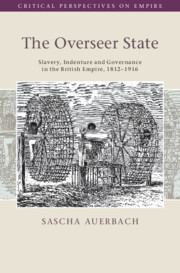Book contents
- The Overseer State
- Critical Perspectives on Empire
- The Overseer State
- Copyright page
- Dedication
- Dedication
- Contents
- Maps and Tables
- Plantations
- Preface
- Acknowledgments
- Introduction
- 1 “Not Fit for the Enjoyment of Freedom”
- 2 “To Go and Look for Law”
- 3 “A Most Imperfect Act of Abolition”
- 4 “A System Entirely Favorable to the Poorer Class of Natives”
- 5 “Man, in His Natural State … Must Either Be Led by Conviction, or by Force”
- 6 “They Must Know Their Master, and He Must Know Them”
- 7 “They Have Made the Government Arbitrary Enough”
- Conclusion
- Bibliography
- Index
6 - “They Must Know Their Master, and He Must Know Them”
Labor Governance and Sovereignty on the Imperial Frontier in Southeast Asia, 1867–1890
Published online by Cambridge University Press: 21 March 2025
- The Overseer State
- Critical Perspectives on Empire
- The Overseer State
- Copyright page
- Dedication
- Dedication
- Contents
- Maps and Tables
- Plantations
- Preface
- Acknowledgments
- Introduction
- 1 “Not Fit for the Enjoyment of Freedom”
- 2 “To Go and Look for Law”
- 3 “A Most Imperfect Act of Abolition”
- 4 “A System Entirely Favorable to the Poorer Class of Natives”
- 5 “Man, in His Natural State … Must Either Be Led by Conviction, or by Force”
- 6 “They Must Know Their Master, and He Must Know Them”
- 7 “They Have Made the Government Arbitrary Enough”
- Conclusion
- Bibliography
- Index
Summary
Chapter 6 focuses on the British Straits Settlements and the Malay States. At the edge of the imperial frontier, where Chinese organizations and their attendant customs had long held sway, British laws and institutions struggled to gain a foothold. From its precarious state in the early 1870s, in the course of a few decades, Britain’s toehold on the Malay Peninsula would solidify in the Straits Settlements and extend to encompass the Malay States. The rapid extension of state control over labor transformed one of the empire’s most strategically vital cities and some of its most inaccessible and unruly territory from, or so British officials would claim, locales of lawless immorality to models of civilized behavior, orderly governance, and stable prosperity. As the overseer-state struggled to establish its political supremacy against highly resilient cultural and economic systems established previously by the Chinese Secret Societies and kongsi, its success or failure hinged increasingly on its ontological power to define moral governance and just rule. In this sense, British colonial authority in the Straits Settlements was synonymous with regulation of the Chinese workforce.
- Type
- Chapter
- Information
- The Overseer StateSlavery, Indenture and Governance in the British Empire, 1812–1916, pp. 237 - 280Publisher: Cambridge University PressPrint publication year: 2025

